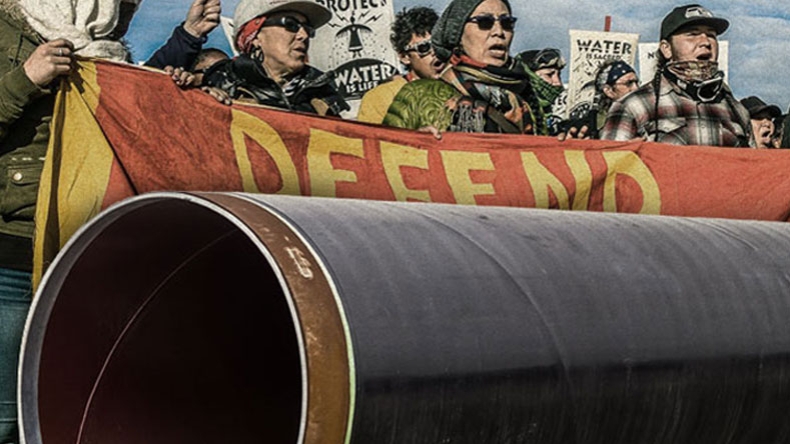Op 22 september jl. ontving ik van Rainforest Action Network (RAN) voor de tweede keer een petitie* waarin grote banken worden opgeroepen niet langer klimaatrampen** te financieren, dit middels de financiering van: -fossiele brandstofwinning, -de winning van mineralen, -winning van goud, -coltan (dat weer mineralen bevat) e.d. Belangrijk genoeg deze oproep nog eens te herhalen.
Op 24 oktober is er een bijeenkomst van de grote banken in Brazilië, waar men zal spreken over de Equator Principles, principes waaraan de aangesloten banken zich dienen te houden en waarbij ze beloven geen schade of zo min mogelijk schade aan te richten op het gebied van milieu en klimaat, daarnaast zou e.e.a. niet ten koste mogen gaan van de arbeiders en het leefgebied van oorspronkelijke bevolkingsgroepen (neem de Dakota Access Pipeline (DAPL).
Na alle berichtgeving over oorspronkelijke bewoners van het Braziliaanse Amazonewoud, die worden verjaagd en vermoord, t.b.v. grond om soja te verbouwen, of voor het winnen van mineralen en andere grondstoffen, is het duidelijk dat de grote banken lak hebben aan deze Equator Principles…… Ook bij het eerdere voorbeeld, de DAPL, waren grote banken de financiers, waaronder zelfs het Nederlandse ING (dat zich pas na heel veel druk terugtrok uit dit onzalige project….)….
Lees de volgende oproep van RAN, teken de petitie ajb en geeft het door!!
Tell
big banks to stop financing climate disasters and respect Indigenous
rights

In
30 days, more than 90 of the world’s largest banks will meet in
Brazil to recommit to the Equator Principles, a set of rules guiding
which big infrastructure projects they will and won’t
finance.1
“Equator Banks” have promised
to avoid or minimize the social, environmental and climate impacts of
such projects, and to respect the rights and interests of Indigenous
communities affected by them.2 But they haven’t kept
their word.
-
The
Dakota Access Pipeline was financed by banks signed on to the
Equator Principles even though it was built to pump tar sands, the
dirtiest oil on earth, and was fiercely opposed by the Standing Rock
Sioux and Cheyenne River Lakota Tribes for threatening their water
sources.3 -
The
Honduran Agua Zarca hydro project, where Indigenous leader Berta
Cáceres was murdered for leading Indigenous resistance to the
project, also passed the
‘Equator test’ of FMO bank as a project supposedly respecting
the rights of the Lenca communities.4
These
are just a couple examples of projects financed by banks under the
Equator Principles that are resisted by Indigenous communities. All
over the world, Equator banks also continue to finance new coal power
plants that will further add to climate disruption.
Sign
here to tell the banks to stop funding climate devastation and
respect Indigenous rights.
The
October 24 meeting in São Paulo, Brazil is a clear opportunity for
Equator Banks to revisit their Principles and commit to a higher
standard of practice. Advocates will be on the ground in Brazil, and
local activists around the world are planning related actions around
the same time to increase the pressure.5
As
a powerful coalition of human rights, environmental and
Indigenous-led organizations, we’re demanding that the big banks
stop financing climate disasters and respect Indigenous peoples’
rights and land.We
need you to sign on and show these banks that every customer on every
continent sees what they’re up to and demands that they commit to
making changes.
In
solidarity,
Vanessa Green, Director, DivestInvest Individual

1
– https://www.equatorbanksact.org/
2
– Coal power plants, coal mines, tar sands exploration and transport,
oil pipelines, fracked gas plants, deepwater oil rigs, oil
exploration in the Arctic, and more have all qualified as
‘responsible’ projects under the Equator Principles, as have
projects that violate international Indigenous rights. From the
Americas to Australia, Indigenous peoples find themselves on the
front line of struggles against fossil fuel extraction and transport
projects, and also large hydro and other infrastructure projects that
threaten their lands and way of life.
3
– https://www.banktrack.org/search#category=dodgydeals
4
– https://www.banktrack.org/search#category=dodgydeals
5
– https://mazaskatalks.org/divesttheglobe
Further
Resources
https://www.ran.org/banking_on_climate_change
========================================
* Voor de eerste petitie zie: ‘Grote banken overtreden eigen duurzaamheidsregels……..‘
** Klimaatrampen als de sterke orkanen van de laatste weken, orkanen die steeds sneller groeien en steeds sterker worden……
en: ‘The Dakota Access Pipeline Is Already Leaking‘
en: List of pipeline accidents in the United States in the 21st century‘ (stuitend!!)

